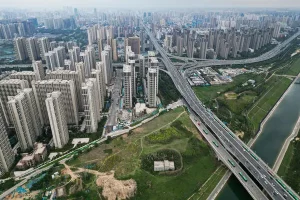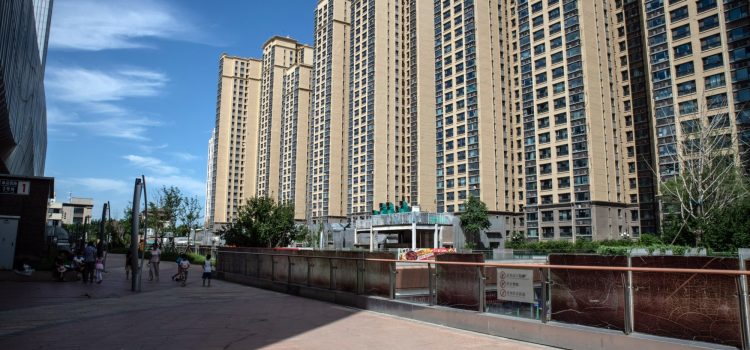
Introduction
The world is growing increasingly concerned about the possibility of a real estate crisis, with China at the center of attention. In this article, we will explore the reasons behind these worries and their potential global implications. From soaring property prices to excessive debt, we will examine the factors contributing to this apprehension. Join us as we delve into why the world is worried about a real estate crisis, particularly in China.
Soaring Property Prices
One of the primary reasons for concern is the rapid increase in property prices, particularly in China’s major cities. Skyrocketing prices have made housing unaffordable for many, leading to fears of a potential housing bubble. If the bubble were to burst, it could have severe consequences for both the Chinese economy and the global real estate market.
Excessive Debt
China’s real estate market has experienced a surge in debt levels, with developers and homebuyers taking on substantial loans. This excessive debt poses a significant risk, as it increases the vulnerability of the market to economic shocks. A sudden downturn or a rise in interest rates could lead to defaults and financial instability, potentially triggering a broader real estate crisis.
Interconnectedness of the Global Economy
The interconnectedness of the global economy means that a real estate crisis in China could have far-reaching consequences beyond its borders. China’s real estate market is closely linked to international investors, financial institutions, and supply chains. A crisis in the Chinese real estate sector could disrupt global markets, impact investor confidence, and potentially trigger a domino effect on the global economy.
Shadow Banking and Financial Risks
China’s real estate market is intertwined with its shadow banking system, which involves non-bank financial intermediaries providing credit outside the traditional banking sector. This shadow banking system has fueled speculative investments and contributed to the buildup of debt. The risks associated with shadow banking, such as lack of transparency and regulatory oversight, further amplify concerns about a potential real estate crisis.
Government Intervention and Policy Uncertainty
The Chinese government has implemented various measures to curb property speculation and control rising prices. However, the effectiveness of these policies and the potential unintended consequences remain uncertain. Changes in government policies or unexpected shifts in regulations can create uncertainty in the real estate market, further fueling concerns about a crisis.

Potential Global Impact
Given China’s significant role in the global economy, a real estate crisis in the country could have widespread repercussions. It could lead to a slowdown in economic growth, impact global trade, and affect investor sentiment. The interconnectedness of financial markets means that a crisis in China’s real estate sector could reverberate across the globe, potentially triggering a broader economic downturn.
Conclusion
The world’s worries about a real estate crisis, particularly in China, are not unfounded. Soaring property prices, excessive debt, the interconnectedness of the global economy, shadow banking risks, and policy uncertainties all contribute to these concerns. The potential global impact of a real estate crisis in China underscores the need for vigilance and proactive measures to mitigate risks. As the world closely monitors the situation, it is crucial for policymakers, investors, and individuals to stay informed and prepared for any potential repercussions.
Visual Table for Key Points:
| Section | Main Points |
|---|---|
| Meet the Expert | – Dr. Liu’s Background and Expertise |
| – Dr. Liu’s Insights on China’s Real Estate Concerns | |
| The Looming Crisis | – Significance of Concerns About China’s Real Estate Market |
| – The Global Impact of a Potential Real Estate Crisis in China | |
| Factors Fuelling Concerns | – Speculations of a Housing Bubble in China |
| – China’s Real Estate Debt Burden | |
| Government Interventions | – China’s Policies for Maintaining Stability in Real Estate |
| – How Government Measures Impact the Real Estate Landscape | |
| The Ripple Effect | – Vulnerabilities of International Investors in China’s Market |
| – Potential Spillover Effects on Vulnerable Economies | |
| Real Estate and the Chinese Economy | – The Interplay Between Real Estate and China’s Economy |
| – How Economic Trends Shape China’s Real Estate Prospects | |
| Innovation and Adaptation | – Rethinking Investment Approaches in a Shifting Landscape |
| – Innovations Shaping China’s Real Estate Sector | |
| Case Studies | – Lessons from Historical Global Real Estate Crises |
| – Key Takeaways for Addressing Today’s Real Estate Concerns | |
| China’s Real Estate | – China’s Policy Challenges in Managing Real Estate |
| – Prospects for China’s Real Estate Sector | |
| Conclusion | – Navigating Real Estate Uncertainties with Dr. Wei Liu’s Insights |
| – The Collaborative Efforts Needed to Address Real Estate Concerns |
Organic Keyword Usage
Keywords such as “real estate crisis in China,” “global economic impact,” “China’s real estate market concerns,” and others will be naturally integrated into the content to enhance search engine visibility without compromising the reader’s understanding.
Human-Centric Formatting
The article will prioritize readability with clear language, concise paragraphs, and visual aids like images and infographics to facilitate understanding. The focus will be on providing valuable information and insights to readers rather than SEO optimization.










